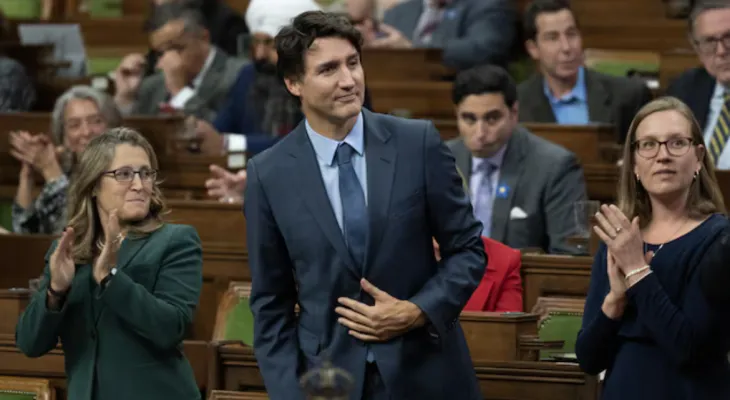Search here
Newspaper
Search here

Arab Canada News
News

Published: October 2, 2024
Today, the minority Liberal government led by Justin Trudeau, which has been weakened by a number of recent political setbacks, survived a second proposal from the Conservative Party to question its confidence.
The vote resulted in a majority of 207 votes against the confidence motion compared to 121 votes in favor of the proposal, which is largely a repeat of the vote that was held last Wednesday on the first proposal from the Conservatives led by Pierre Poilievre to question Trudeau's government.
In this proposal they presented on Thursday, the Conservatives blamed the Liberal government for its failure to address the housing shortage, rising crime rates, and increasing cost of living, claiming that it is "the most centralized government in Canada's history."
As in the previous time, the Bloc Québécois, the New Democratic Party (left-leaning), the Green Party of Canada, in addition to the MPs of the Liberal Party, voted against the motion.
As expected, the Conservatives led by Pierre Poilievre, who form the official opposition in the House of Commons, did not receive support from any of the other opposition parties.
Trudeau's Liberal government needs the support of one of the two major opposition parties, other than the Conservatives, namely the Bloc Québécois or the New Democratic Party (left-leaning), to survive the confidence vote.
If these two parties had supported the Conservatives' proposal, who are the official opposition, the government would have fallen, and early general elections would have been called.
Polls have shown for over a year that such elections would oust the Liberals and bring a Conservative government led by Poilievre.
The Conservatives currently lead the Liberals by about 20 percentage points in voting intentions.
Canada is scheduled to hold federal general elections by no later than October 2025.
The Liberal Party, which came to power under Trudeau in the fall of 2015, has been facing a series of political setbacks since the beginning of summer.
The minority Liberal government has become weak since the New Democratic Party announced about a month ago the end of the "support and confidence agreement" that it had made with it in March 2022, which ensured its survival in power until the end of its term in 2025.
Trudeau's government also lost two parliamentary seats in districts considered to be strongholds of the Liberal Party, one in Toronto and the other in Montreal, in by-elections held consecutively in late June and mid-September.
Most analysts believe that the government will hold on until next spring, as smaller parties need time to prepare for new elections, and Canada typically does not hold general elections in the winter due to its harshness.
However, some experts see that "anything is possible" as the minority Liberal government struggles in a divided House of Commons.
Comments